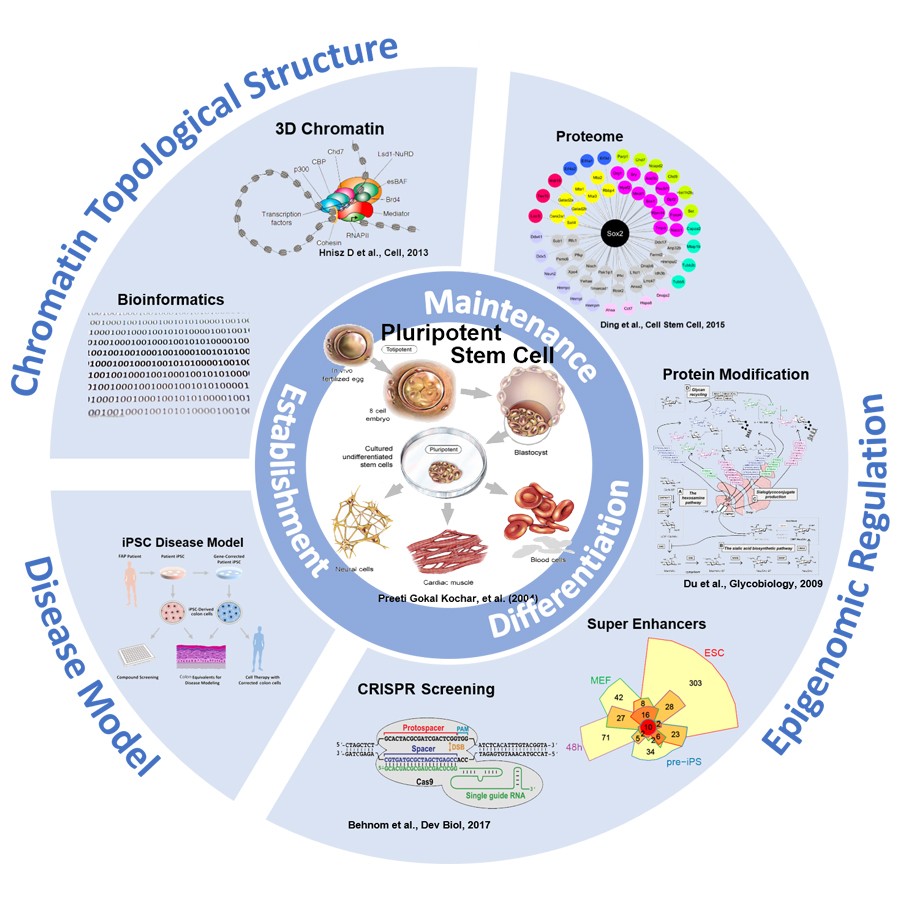Research
Primary Interest

We study the molecular mechanism of stem cell pluripotent and somatic reprogramming, and clarify the regulatory mechanisms of early embryo development through the establishment of single-cell multi-omics technologies, while also using iPS cells to establish tumor models, which shows significant importance to the clinical application of stem cells. Based on these, we carry out the following researches:
1. Using the means of gene editing and proteomics, we study the epigenetic reoulation mechanisms of pluripotent stem cells, somatic cell reprogramming and early embryonic development, especially the regulatory mechanism and function of phase separation.
2. Developing novel single-cell multi-omics technologies (such as CARE-seq, Couple-seq, etc.), and combine them with chromatin three-dimensional structure techniques (such as HiC, HiChIP, etc.) to study the epigenetic mechanisms underlying stem cell fate transitions and early embryonic development.
3. Establishing bioinformatics and artificial intelligence (such as machine learning) related algorithms to conduct epigenomics research, integrating two-dimensional data such as genomics, transcriptomics, and proteomics with three-dimensional chromatin data such as HiC and HiChIP, to study cell fate and disease development.
4. Using organoid technology and induced pluripotent stem cells (iPSCs), the world's first breast cancer model was established. It is so far the only system capable of tracing tumor-initiating cells and the mechanisms of tumor origin, and it is further used to study tumor pathogenesis and to screen drugs for prevention and treatment.
本课题组通过深入研究干细胞的多能性以及体细胞重编程的分子机理,并通过建立单细胞多组学技术阐明早期胚胎发育的调控机制,同时利用iPS细胞建立肿瘤疾病模型,对于干细胞的临床应用具有重要意义。基于此,实验室正在开展以下几个方面研究:
-
利用基因编辑和蛋白质组学等手段研究多能干细胞、体细胞重编程以及早期胚胎发育的表观遗传调控机制,特别是相分离的调控机制和功能;
-
开发新型单细胞多组学技术(CARE-seq、Couple-seq等),并结合染色质三维结构技术(HiC、HiChIP等)研究干细胞命运转变及早期胚胎发育的表观机制;
-
建立生物信息学、人工智能(机器学习等)等相关算法进行表观组学研究,整合二维的基因组学、转录组学、蛋白组学等数据和HiC、HiChIP等染色质三维数据,进行细胞命运和疾病发生的研究;
-
利用类器官技术和诱导多能干细胞(iPS细胞)建立了世界上首个乳腺癌模型,是迄今唯一能追踪肿瘤起源细胞和起源机制的系统,进一步利用该模型研究肿瘤发病机理、筛选预防及治疗药物等。
